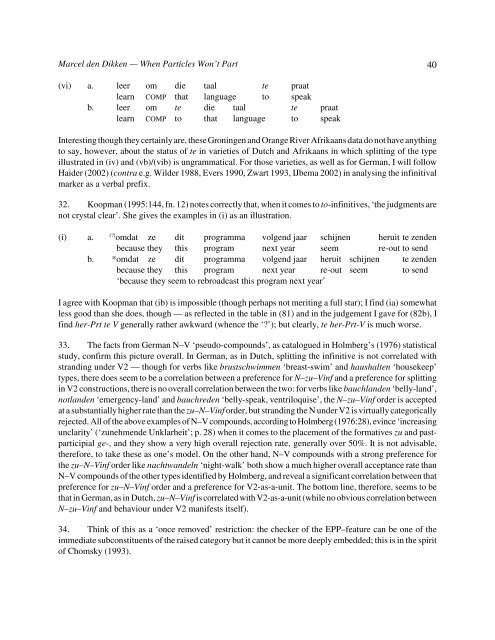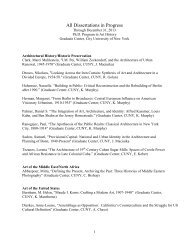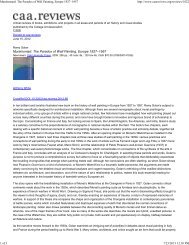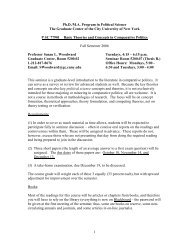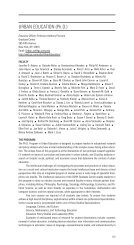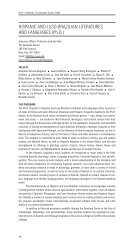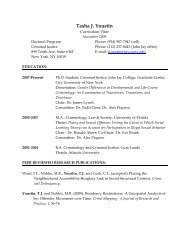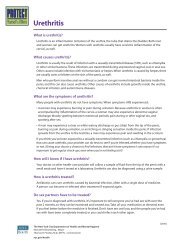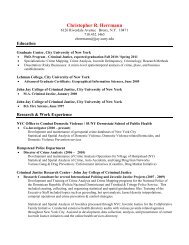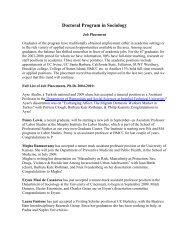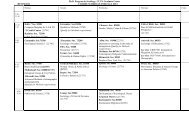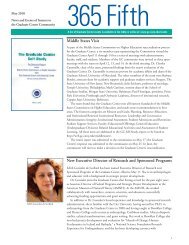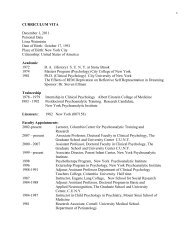When Particles Won't Part - CUNY Graduate Center
When Particles Won't Part - CUNY Graduate Center
When Particles Won't Part - CUNY Graduate Center
You also want an ePaper? Increase the reach of your titles
YUMPU automatically turns print PDFs into web optimized ePapers that Google loves.
Marcel den Dikken — <strong>When</strong> <strong><strong>Part</strong>icles</strong> Won’t <strong>Part</strong><br />
(vi) a. leer om die taal te praat<br />
learn COMP that language to speak<br />
b. leer om te die taal te praat<br />
learn COMP to that language to speak<br />
Interesting though they certainly are, these Groningen and Orange River Afrikaans data do not have anything<br />
to say, however, about the status of te in varieties of Dutch and Afrikaans in which splitting of the type<br />
illustrated in (iv) and (vb)/(vib) is ungrammatical. For those varieties, as well as for German, I will follow<br />
Haider (2002) (contra e.g. Wilder 1988, Evers 1990, Zwart 1993, IJbema 2002) in analysing the infinitival<br />
marker as a verbal prefix.<br />
32. Koopman (1995:144, fn. 12) notes correctly that, when it comes to to-infinitives, ‘the judgments are<br />
not crystal clear’ . She gives the examples in (i) as an illustration.<br />
(i) a. (?) omdat ze dit programma volgend jaar schijnen heruit te zenden<br />
because they this program next year seem re-out to send<br />
b. *omdat ze dit programma volgend jaar heruit schijnen te zenden<br />
because they this program next year re-out seem to send<br />
‘because they seem to rebroadcast this program next year’<br />
I agree with Koopman that (ib) is impossible (though perhaps not meriting a full star); I find (ia) somewhat<br />
less good than she does, though — as reflected in the table in (81) and in the judgement I gave for (82b), I<br />
find her-Prt te V generally rather awkward (whence the ‘?’ ); but clearly, te her-Prt-V is much worse.<br />
33. The facts from German N–V ‘pseudo-compounds’ , as catalogued in Holmberg’ s (1976) statistical<br />
study, confirm this picture overall. In German, as in Dutch, splitting the infinitive is not correlated with<br />
stranding under V2 — though for verbs like brustschwimmen ‘breast-swim’ and haushalten ‘housekeep’<br />
types, there does seem to be a correlation between a preference for N–zu–Vinf and a preference for splitting<br />
in V2 constructions, there is no overall correlation between the two: for verbs like bauchlanden ‘belly-land’ ,<br />
notlanden ‘emergency-land’ and bauchreden ‘belly-speak, ventriloquise’ , the N–zu–Vinf order is accepted<br />
at a substantially higher rate than the zu–N–Vinf order, but stranding the N under V2 is virtually categorically<br />
rejected. All of the above examples of N–V compounds, according to Holmberg (1976:28), evince ‘increasing<br />
unclarity’ (‘zunehmende Unklarheit’ ; p. 28) when it comes to the placement of the formatives zu and pastparticipial<br />
ge-, and they show a very high overall rejection rate, generally over 50%. It is not advisable,<br />
therefore, to take these as one’ s model. On the other hand, N–V compounds with a strong preference for<br />
the zu–N–Vinf order like nachtwandeln ‘night-walk’ both show a much higher overall acceptance rate than<br />
N–V compounds of the other types identified by Holmberg, and reveal a significant correlation between that<br />
preference for zu–N–Vinf order and a preference for V2-as-a-unit. The bottom line, therefore, seems to be<br />
that in German, as in Dutch, zu–N–Vinf is correlated with V2-as-a-unit (while no obvious correlation between<br />
N–zu–Vinf and behaviour under V2 manifests itself).<br />
34. Think of this as a ‘once removed’ restriction: the checker of the EPP–feature can be one of the<br />
immediate subconstituents of the raised category but it cannot be more deeply embedded; this is in the spirit<br />
of Chomsky (1993).<br />
40


